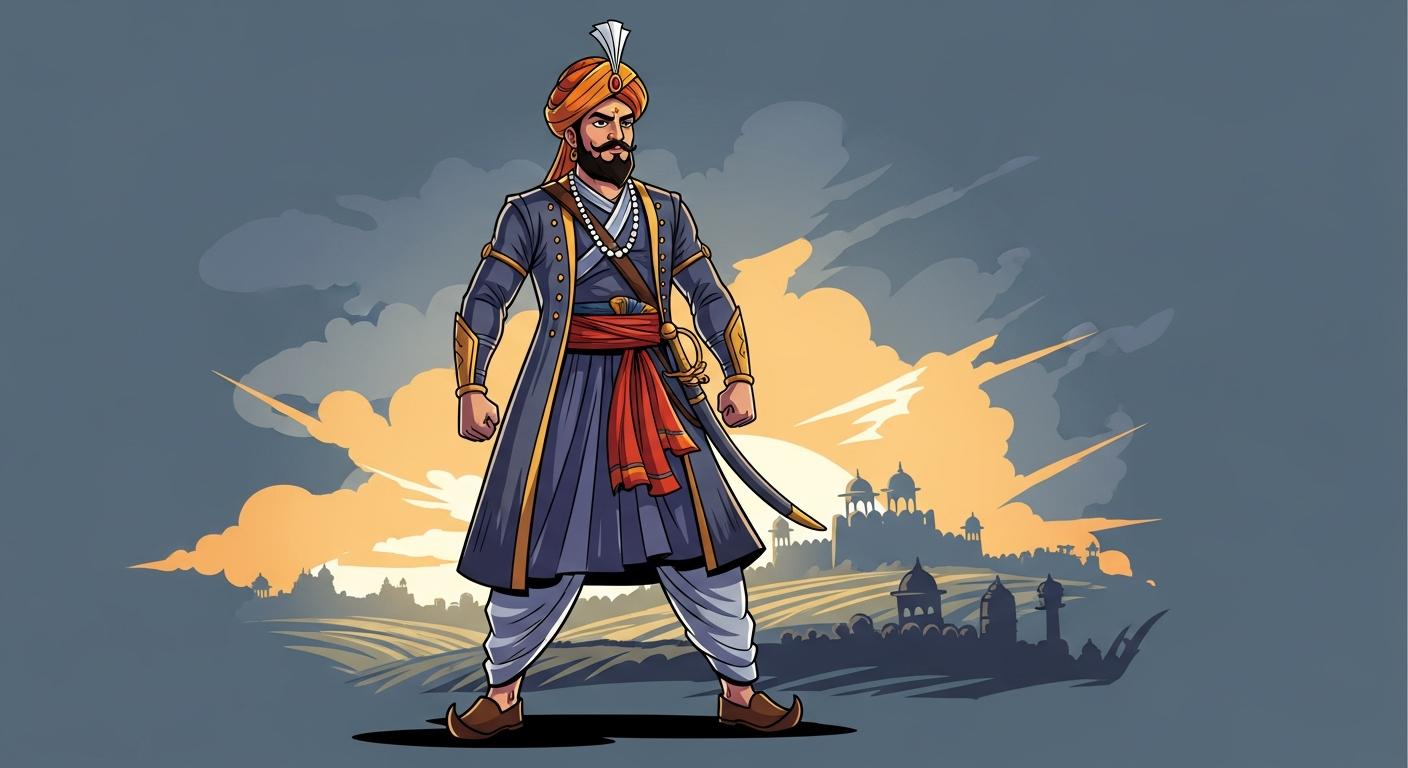Summarize this Article with:

In the grand tapestry of history, there are figures whose stories transcend the boundaries of time, leaving an indelible mark that resonates across generations. Joan of Arc, a name that echoes with bravery, conviction, and a resolute spirit, stands tall among these luminaries. Her journey, interwoven with the fabric of the Hundred Years’ War, illuminates a path of courage and defiance that continues to captivate hearts to this day.
As the tumultuous winds of the Hundred Years’ War swept across medieval France, it was Joan of Arc who emerged as a beacon of hope amidst the chaos. An icon of valor and faith, her story is a testament to the power of unwavering determination and a fervent belief in a higher purpose.
In the crucible of history, Joan’s role as a peasant girl turned warrior, strategist, and visionary, redefines the boundaries of possibility. Her unwavering devotion to her divine calling, her audacity to challenge societal norms, and her remarkable feats on the battlefield forged an unforgettable saga of resilience and triumph.
The legacy of Joan of Arc extends far beyond her time, leaving an imprint on culture, literature, and the collective imagination. Her unyielding spirit continues to inspire individuals to stand up against adversity, to pursue their convictions with unwavering resolve. In the pages that follow, we shall unravel the captivating narrative of Joan of Arc, a saga that speaks of valor, mysticism, and an indomitable quest for justice.
As we embark on this journey through history, let us delve deep into the life, trials, and triumphs of Joan of Arc, a figure whose legacy shines as a guiding light through the ages.
Personal and Professional Details
| Category | Details |
| Full Name | Jeanne d’Arc (Joan of Arc) |
| Birth | Around 1412 (exact date uncertain) |
| Birthplace | Domrémy, France |
| Nationality | French |
| Parents | Jacques d’Arc (father), Isabelle Romée (mother) |
| Religion | Catholicism |
| Divine Visions | Claimed to receive visions and voices from saints and angels, guiding her actions and mission |
| Accomplishments | Led French forces to key victories during the Hundred Years’ War, played a significant role in the coronation of Charles VII |
| Trial and Execution | Captured, put on trial, and executed by burning at the stake in 1431 |
| Canonization | Canonized as a saint by the Catholic Church in 1920 |
| Legacy | Symbol of courage, faith, and resistance; inspirational figure in literature, art, and popular culture |
Early Life and Divine Calling: A Glimpse into the Unassuming Beginnings
In the quiet hamlet of Domrémy, nestled amidst the picturesque landscapes of France, Joan of Arc took her first breath in the year 1412. Her birth heralded a life that would blaze a trail of courage and resilience, transforming her from an ordinary village girl into a beacon of hope for an entire nation.
Joan’s upbringing was rooted in the simplicity and serenity of rural life. With the gentle cadence of nature as her backdrop, she imbibed the values of humility, piety, and hard work. Her days were spent amidst the rhythm of daily chores, where the bonds of family and faith formed the foundation of her character.
It was during these formative years that the divine hand of destiny reached out to Joan, setting her on an extraordinary path. During her daily routines, she experienced visions and heard celestial voices that would shape the course of her life. These ethereal encounters bestowed upon her a divine mission – to aid the embattled French forces and pave the way for the Dauphin’s coronation.
The nature of these visions was deeply intertwined with Joan’s unwavering faith. Guided by the voices she believed to be those of saints and angels, Joan received directives that left no room for doubt. These divine messages not only kindled her resolve but also affirmed her purpose in the face of doubt and skepticism.
Joan of Arc’s journey began with humble origins, yet her upbringing and spiritual experiences cast her as an enigmatic figure. In the presence of the rustic landscapes that bore witness to her early years, the foundations of a destiny intertwined with valor and mysticism were laid. As we peer into her life’s early chapters, we catch glimpses of the remarkable calling that would propel her onto the grand stage of history.
The Warrior Maiden’s Rise: A Triumph of Conviction and Leadership
In a world where battlefields were dominated by men, Joan of Arc defied convention with an unyielding conviction that would reshape the course of history. As the tumultuous currents of the Hundred Years’ War raged on, she emerged as a beacon of hope, leading the charge with a blend of courage, faith, and strategic acumen.
Joan’s conviction to lead the French forces was a fire that burned brightly within her. With a heart aflame with purpose, she left behind the sheltered confines of her village and embarked on a remarkable journey that would bring her to the very heart of the Dauphin’s court. Her unwavering belief in her divine calling propelled her forward, setting the stage for one of history’s most remarkable alliances.
It was within the hallowed halls of Charles VII’s court that Joan’s charisma and resolve took center stage. Despite her humble origins and her status as a young woman in a male-dominated realm, she held her ground with a remarkable blend of humility and authority. Her interactions with Charles VII, the Dauphin of France, were marked by a palpable sense of destiny as if their meeting had been foretold by the same celestial voices that had guided her.
Yet, it was on the battlefield that Joan’s true prowess shone brightest. Clad in armor, she exhibited a military prowess that transcended gender norms. Her strategic brilliance was evident in her ability to rally the troops, devise ingenious tactics, and make decisive decisions under immense pressure. In battles like Orléans and Patay, her leadership breathed new life into the French forces, turning the tide of the war and igniting a renewed sense of hope.
Joan of Arc’s influence on the battlefield was a testament to her unwavering spirit and the magnetism of her leadership. Her conviction to lead, her interactions with the Dauphin, and her strategic brilliance collectively shaped her legacy as a warrior maiden who defied expectations and left an indelible mark on the pages of history.
Trials and Martyrdom: A Tale of Unyielding Faith and Tragic Sacrifice
As Joan of Arc’s resolute footsteps echoed on the battlefield, destiny wove a narrative that would test her courage and faith to the very limits. Captured by her enemies, her journey took an agonizing turn that would culminate in a trial that reverberated through time as a testament to her unwavering spirit.
Joan’s capture marked a turning point in her extraordinary odyssey. The hands that once wielded the sword with valor were now bound, but her indomitable will remained unbroken. The trial that followed was a tumultuous saga of accusations, intrigue, and the crushing weight of charges of heresy. Yet, in the face of relentless scrutiny, Joan displayed a strength that mirrored her battles on the battlefield.
Her defense in the trial was a masterclass in resilience and conviction. Armed not with armor but with her unshakable faith, Joan’s responses revealed a mind and heart steadfast in the face of adversity. She navigated the intricate legal proceedings with an intelligence that left even her adversaries awestruck, highlighting her intellect and her ability to stand her ground against overwhelming odds.
Tragically, the wheels of fate turned against Joan, leading to her ultimate martyrdom. The flames that engulfed her became a symbol of her sacrifice and unwavering loyalty to her divine mission. Yet, the question of whether she cried when faced with the flames remains shrouded in history’s enigmatic embrace.
While some historical accounts mention tears, Joan’s final moments remain a poignant mystery. Regardless of whether tears fell from her eyes, her stoic resolve in the face of death serves as a poignant reminder of her indomitable spirit.
Joan of Arc’s trials and martyrdom transcend time as a tale of unyielding faith and tragic sacrifice. Her capture, trial, and ultimate fate paint a portrait of a woman who, even in the darkest hours, stood tall against injustice, inspiring generations to come.
Enduring Legacy and Cultural Impact: Joan’s Flame Illuminating Through Time
The flickering flame of Joan of Arc’s legacy continues to defy the passage of centuries, casting its brilliance on a world hungry for tales of courage, resilience, and unwavering faith. Beyond the boundaries of her time, Joan’s story has transcended generations, leaving an indelible mark on the collective human consciousness.
At the heart of Joan’s enduring legacy is the profound inspiration she offers to all who dare to challenge adversity. Her life serves as a testament to the boundless potential of courage, faith, and conviction. In a world often overshadowed by doubt and fear, Joan’s unwavering belief in her divine mission stands as a luminous example of the heights the human spirit can ascend to.
Beyond the annals of history, Joan’s legacy echoes through the corridors of culture. Her impact has been immortalized in literature, where countless authors have penned tributes to her valor and vision. From Shakespeare to Mark Twain, her name has graced the pages of celebrated works, each a testament to the magnetic pull of her story.
Art, too, has paid homage to Joan’s exceptional abilities. Paintings, sculptures, and operas have sought to capture her enigmatic spirit, immortalizing her image in myriad forms. From the delicate strokes of a painter’s brush to the resounding crescendos of musical compositions, Joan’s influence permeates the world of artistic expression.
Amidst the retellings and artistic renditions, one truth remains resolute – Joan of Arc’s exceptional abilities continue to captivate hearts and minds. Whether it’s her strategic prowess on the battlefield or her resolute defense in the face of trial, her legacy reminds us that humanity’s potential knows no bounds.
In the grand tapestry of human history, Joan’s legacy shines as a beacon of hope, resilience, and the unbreakable spirit of a maiden warrior. Her story, so rich with complexity and courage, invites us to look beyond the surface and embrace the extraordinary within ourselves. Joan’s flame, a symbol of unwavering conviction, continues to illuminate the darkness, urging us to find the strength within to overcome any challenge that comes our way.
Why is She Called Joan of Arc? Unraveling the Name’s Mystique
The name “Joan of Arc” resonates through history like an echo of valor and mysticism, evoking the image of a warrior maiden who defied convention. Yet, behind this iconic name lies a tapestry of significance that weaves together language, symbolism, and the fervor of a bygone era.
The name “Joan,” derived from the Old French “Jehanne,” reflects a common moniker of the time. However, it is the addition of “of Arc” that bestows an aura of profound symbolism upon her identity. The term “Arc” points to her hometown, Domrémy, situated near the meandering River Meuse. This addition of geographical provenance to her name serves as a reminder of her humble origins, accentuating the contrast between her rustic beginnings and her eventual rise to prominence.
Interestingly, Joan is also known by the French version of her name, “Jeanne d’Arc.” This alternate rendering, “d’Arc,” meaning “of Arc,” preserves the same geographical link while embracing the French language’s nuances. This dual nomenclature further underlines the dualities that defined her life – a peasant girl who would emerge as a national heroine, a warrior who would champion peace, and a figure who would blur the lines between the ordinary and the extraordinary.
The symbolism embedded in her name extends beyond geography. In a time when divine intervention was believed to shape destinies, Joan’s name carries an air of celestial purpose. Her identity as the “Maid of Orléans” and the “Maiden Warrior” further amplifies her connection to higher realms, reinforcing the divine voices and visions that guided her.
In the tapestry of history, Joan of Arc’s name is more than a mere identifier; it is a reflection of her extraordinary journey. Her name echoes through time, encapsulating the paradoxes and complexities of her existence. Whether known as Joan of Arc or Jeanne d’Arc, her name is a living testament to a life that transcended boundaries, leaving an indelible mark on the world and serving as a reminder that even the most ordinary names can carry within them the power to shape destiny.
Did Joan of Arc Cry When She Died? Exploring the Tears of a Martyr
The final moments of Joan of Arc’s life are shrouded in the mists of history, mingling fact with myth, and evoking a poignant question that lingers through the ages – did she shed tears as the flames consumed her? The emotional aspect of her martyrdom unveils a canvas of complex feelings, where courage and vulnerability intertwine in a dance that transcends time.
Historical accounts surrounding Joan’s execution vary in their portrayal of her emotional state. While some narratives suggest that she faced her fate with unwavering composure, others hint at a more human response – the possibility of tears. In the face of imminent death, the emotional intensity of the moment cannot be denied, and it is within this emotional crucible that the question of tears gains significance.
The act of shedding tears in the face of death does not diminish the valor of Joan’s spirit; rather, it adds layers of depth to her humanity. It is a reminder that even the most resolute souls are not immune to the stirrings of emotion, especially when confronted with the ultimate sacrifice. Tears, in this context, become a symbol of the complexity of Joan’s character, reflecting the profound weight of her divine mission and the stark reality of her impending demise.
As we contemplate whether Joan of Arc cried when she died, we are drawn into the enigmatic realm where courage and vulnerability intersect. The tears, if they were shed, become a testament to the rich tapestry of her identity – a warrior who faced death with unwavering faith, a visionary who stood her ground, and a young woman who, like all humans, experienced a spectrum of emotions in her journey.
Whether the tears flowed or not, the legacy of Joan of Arc remains unblemished. Her martyrdom, marked by the flames that claimed her life, continues to captivate hearts and minds. In the end, the emotional aspect of her martyrdom serves as a poignant reminder that even in the face of death, the most exceptional souls remain deeply connected to the realm of human feelings.
Unraveling Joan of Arc’s Excellence: The Tapestry of Exceptional Qualities
The allure of Joan of Arc’s extraordinary abilities transcends time, leaving us in awe of a young woman who shattered norms and defied expectations. Delving into the depths of her remarkable talents reveals a tapestry woven with exceptional leadership, strategic brilliance, and unwavering faith that ignited her meteoric rise.
At the heart of Joan’s excellence was her innate leadership prowess. Born from a place of conviction and a deep sense of purpose, her leadership radiated with authenticity. She possessed an uncanny ability to inspire and rally troops, forging a profound connection that transcended her humble origins. Joan’s leadership wasn’t defined by hierarchy but by the resonance of her unwavering faith and the confidence she instilled in those who followed her banner.
Strategic acumen further solidified Joan’s reputation as a force to be reckoned with. In an era when warfare was a complex dance of tactics and maneuvers, Joan displayed a level of strategic brilliance that astounded even seasoned commanders. Her unconventional strategies, such as the swift liberation of Orléans, showcased an intuitive grasp of battlefield dynamics that was nothing short of remarkable.
However, it was Joan’s unwavering faith that formed the bedrock of her exceptional abilities. Guided by divine voices and visions, she possessed a conviction that transcended the tangible realm. This faith wasn’t just a personal belief; it was a driving force that fueled her audacious feats and gave her the courage to challenge the status quo. Her steadfast belief in her divine mission was infectious, igniting a flame of hope in the hearts of her compatriots.
The symphony of Joan’s excellence harmonized her leadership, strategic prowess, and unwavering faith into a crescendo that echoed through history. Her abilities were underpinned by an unwavering determination to shape her destiny and that of her nation. In an age where women were often relegated to the background, Joan’s brilliance shattered the glass ceiling of expectations, leaving an indelible mark on the pages of history.
Joan of Arc’s exceptionalism wasn’t born from chance; it emerged from the intersection of her qualities – qualities that continue to inspire generations. Her leadership, strategic genius and steadfast faith serve as a timeless reminder that true excellence stems from the fusion of passion, purpose, and the audacity to embrace one’s full potential.
Unveiling the Name: Joan of Arc’s Identity Beyond Words
The name “Joan of Arc” carries a weight of history, resonating through the ages as a symbol of courage and resilience. Beyond its linguistic simplicity, this name encapsulates a profound narrative that weaves together geography, language, and the intricate tapestry of a remarkable life.
The significance of the name “Joan” is twofold. First, it reflects the commonality of the era, grounding Joan’s identity in the ordinary lives of the people she represented. Yet, this very name transcends the mundane, elevating her into the realm of the extraordinary. It’s a paradoxical blend that underscores the dichotomy of her existence – an ordinary girl destined for extraordinary feats.
The addition of “of Arc” holds the key to unraveling deeper layers of meaning. The term “Arc” anchors her identity in the very land that nurtured her – Domrémy, a village nestled near the River Meuse. This geographical link serves as a bridge between her humble beginnings and the grand stage of history. The name becomes a conduit through which her journey unfolds, from the rustic landscapes of her upbringing to the battlefields that would define her legacy.
In the annals of history, Joan is also known by her French name, “Jeanne d’Arc.” This alternative rendition echoes the same geographical bond while embracing the nuances of the French language. “D’Arc,” meaning “of Arc,” further enhances her connection to her homeland, emphasizing the roots from which her valor would sprout.
The variations in her name reflect the multifaceted nature of her identity. From the simplicity of “Joan” to the resonance of “Jeanne d’Arc,” each form offers a glimpse into different aspects of her character. The name transcends linguistic boundaries, embodying the essence of her historical context while serving as a bridge between cultures and epochs.
Joan of Arc’s name is a portal to her story, an encapsulation of her paradoxes and complexities. It’s a name that travels through time, connecting us to a girl who defied expectations, a warrior who challenged norms, and a symbol of courage that endures. In every utterance of her name, her legacy awakens, inviting us to peer beyond the letters and delve into the rich narrative of a life that continues to inspire and captivate.
Conclusion: Joan of Arc’s Enduring Flame of Inspiration
In the annals of history, Joan of Arc emerges not just as a figure, but as a beacon of courage, conviction, and unwavering faith. Her journey, painted with the colors of valor and mysticism, stands as a testament to the power of the human spirit to transcend limitations and reshape destinies.
From the tranquil hamlet of Domrémy to the tumultuous battlefields, Joan’s footsteps resound with a resolute determination that defied the norms of her time. Her exceptional leadership, strategic brilliance, and unyielding faith ignited a fire that galvanized an entire nation. The name “Joan of Arc” encapsulates her significance – a common name tethered to extraordinary deeds.
Joan’s impact extends beyond her time, etching her legacy into the annals of history, culture, and the human spirit. Her story has ignited the imaginations of poets, authors, and artists across centuries, leaving an indelible mark on literature and art. But her legacy transcends the confines of creative expression; it resonates as a reminder that the seemingly ordinary can wield extraordinary influence.
As we bid farewell to this chronicle, the flame of Joan’s inspiration continues to burn brightly. Her story kindles the sparks of courage in hearts that face adversity, reminding us that even in the darkest moments, one individual’s unwavering belief can illuminate the path to change. Joan’s tale is an eternal wellspring of hope, encouraging generations to stand tall against injustice and embrace the convictions that define us.
In a world often riddled with doubt, Joan of Arc’s narrative speaks with unwavering clarity. Her journey is more than history; it’s a living testament to the human potential to rise above circumstances and chart one’s course.
From her name to her legacy, Joan’s story beckons us to heed the call of courage, embrace our unique missions, and stand unflinching against the tides of doubt. In every retelling, her flame rekindles, ensuring that her spirit remains an eternal source of inspiration for all who dare to dream and dare to act.
Hey kids, how much did you like Joan of Arc Biography: A Tale of Courage and Faith? Please share your view in the comment box. Also, please share this story with your friends on social media so they can also enjoy it, and for more such biography, please bookmark storiespub.com.
Suggested Biography –
Joan of Arc FAQs
Who was Joan of Arc?
Joan of Arc was a French peasant girl who, during the Hundred Years' War, claimed to have received divine guidance to support the Dauphin of France and help drive out English forces from France.
What is Joan of Arc known for?
Joan of Arc is known for her role as a warrior maiden who played a pivotal role in the Hundred Years' War by leading French troops to victory and assisting in the coronation of Charles VII.
How did Joan of Arc die?
Joan of Arc was executed by burning at the stake in Rouen, France, in 1431 after being charged with heresy.
Why was Joan of Arc considered a martyr?
Joan of Arc is considered a martyr because she was put on trial and executed for her beliefs and actions, including her claims of divine visions and her efforts to defend France.
What were Joan of Arc's divine visions?
Joan of Arc claimed to have received visions and heard voices of saints and angels, which she believed were messages from God guiding her to support the Dauphin and liberate France.
What impact did Joan of Arc have on history?
Joan of Arc's impact on history is significant; she inspired French troops and contributed to key victories, and her legacy continues to inspire courage and determination.
What is Joan of Arc's legacy today?
Joan of Arc's legacy lives on through literature, art, and cultural references. She symbolizes bravery, faith, and standing up for one's convictions.
Was Joan of Arc canonized as a saint?
Yes, Joan of Arc was canonized as a saint by the Catholic Church in 1920, recognizing her devotion and the impact of her actions on French history.
How old was Joan of Arc when she started leading troops?
Joan of Arc was around 17 years old when she first started leading troops and playing a significant role in military campaigns.
Where can I learn more about Joan of Arc's life?
You can learn more about Joan of Arc by exploring historical books, documentaries, and reputable online sources that delve into her life, achievements, and impact.













